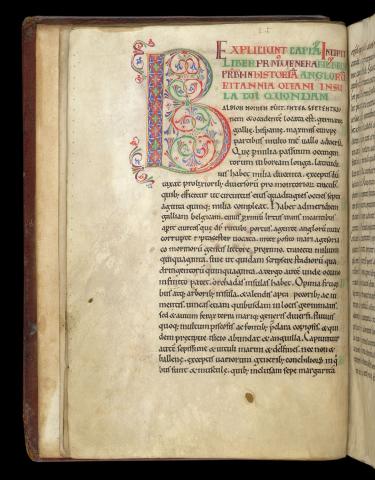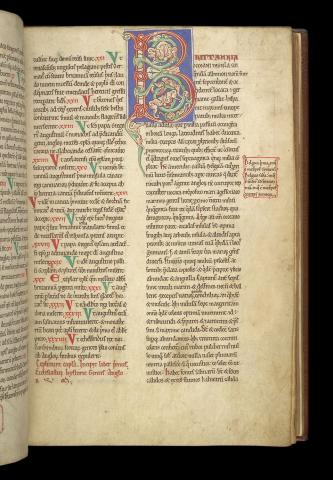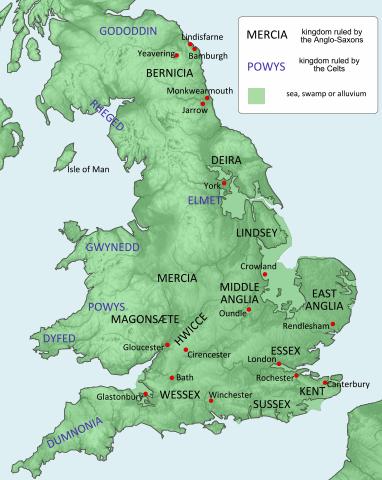< Dē sitū Brittāniae vel Hiberniae et prīscīs eārum incolīs >
[1] Brittānia Ōceanī īnsula, cui quondam Albiōn nōmen fuit, inter septentriōnem et occidentem locāta est, Germāniae, Galliae, Hispāniae, maximīs Eurōpae partibus, multō intervāllō adversa. [2] Quae per mīlia passuum DCCC in boream longa, lātitūdinis habet mīlia CC, exceptīs dumtaxat prōlixiōribus dīversōrum promontoriōrum tractibus, quibus efficitur, ut circuitus eius quadrāgiēs octiēs LXXV mīlia compleat. [3] Habet ā merīdiē Galliam Belgicam, cuius proximum lītus trānsmeantibus aperit cīvitās, quae dīcitur Rutubī portus, ā gente Anglōrum nunc corruptē Reptacæstir vocāta, interpositō marī ā Gessoriacō Morynōrum gentis lītore proximō, trāiectū mīlium L sīve, ut quīdam scrīpsēre, stadiōrum CCCCL. [4] Ā tergō autem, unde Ōceanō īnfīnītō patet, Orcadās īnsulās habet.
[5] Opīma frugibus atque arboribus īnsula, et alendīs apta pecoribus ac iūmentīs; vīneās etiam quibusdam in locīs germināns, sed et āvium ferāx terrā marīque generis dīversī; fluviīs quoque multum piscōsīs ac fontibus praeclāra cōpiōsīs, et quidem praecipuē issicīō abundat et anguillā. [6] Capiuntur autem saepissimē et vitulī marīnī et delphinēs nec nōn et bālaenae, exceptīs variōrum generibus concyliōrum, in quibus sunt et mūsculae, quibus inclūsam saepe margarītam omnis quidem colōris optimam inveniunt, id est et rubicundī et purpureī et iacintīnī et prasinī sed maximē candidī. [7] Sunt et cocleae satis superque abundantēs, quibus tīnctūra coccineī colōris cōnficitur, cuius rubor pulcherrimus nūllō umquam sōlis ārdōre, nūllā valet pluviārum iniūriā pallēscere, sed quō vetustior eō solet esse venustior. [8] Habet fontēs salīnārum, habet et fontēs calidōs, et ex eīs fluviōs balneārum calidārum omnī aetātī et sexuī per distīncta loca iuxtā suum cuique modum accommodōs. [9] Aqua enim, ut sānctus Basilius dīcit, fervidam quālitātem recipit, cum per certa quaedam metalla trānscurrit, et fit nōn sōlum calida sed et ārdēns. [10] Quae etiam vēnīs metallōrum—aeris, ferrī, et plumbī, et argentī—fēcunda, gignit et lapidem gagātēm plūrimum optimumque; est autem nigrogemmeus, et ārdēns ignī admōtus, incēnsus serpentēs fugat, adtrītū calefactus adplicita dētinet, aequē ut sūcinum. [11] Erat et cīvitātibus quondam XX et VIII nōbilissimīs īnsignīta, praeter castella innumera, quae et ipsa mūrīs turribus portīs ac sērīs erant īnstrūcta firmissimīs.
[12] Et quia prope sub ipsō septentriōnālī vertice mundī iacet, lūcidās aestāte noctēs habet, ita ut mediō saepe tempore noctis in quaestiōnem veniat intuentibus, utrum crepusculum adhūc permaneat vespertīnum an iam advēnerit mātūtīnum, utpote nocturnō sōle nōn longē sub terrīs ad orientem boreālēs per plāgās redeunte; unde etiam plūrimae longitūdinis habet diēs aestāte, sīcut et noctēs contrā in brūmā, sōle nīmīrum tunc Lybicās in partēs sēcēdente, id est hōrārum XVIII; plūrimae item brevitātis noctēs aestāte et diēs habet in brūmā, hoc est sex sōlummodo aequinoctiālium hōrārum, cum in Armeniā Macedoniā Ītaliā cēterīsque eiusdem līneae regiōnibus longissima diēs sīve nox XV, brevissima VIIII compleat hōrās.
[13] Haec in praesentī iuxtā numerum librōrum quibus lēx dīvīna scrīpta est, quīnque gentium linguīs, ūnam eandemque summae vēritātis et vērae sublīmitātis scientiam scrūtātur et cōnfitētur, Anglōrum vidēlicet Brettōnum Scottōrum Pictōrum et Latīnōrum, quae meditātiōne scrīptūrārum cēterīs omnibus est facta commūnis.
[14] In prīmīs autem īnsula Brettōnēs sōlum, ā quibus nōmen accēpit, incolās habuit; quī dē tractū Armoricanō, ut fertur, Brittāniam advectī austrālēs sibi partēs illīus vindicārunt.
[15] Et cum plūrimam īnsulae partem incipientēs ab Austrō possēdissent, contigit gentem Pictōrum dē Scythiā, ut perhibent, longīs nāvibus nōn multīs Ōceanum ingressam, circumagente flātū ventōrum, extrā fīnēs omnēs Brittāniae Hiberniam pervēnisse, eiusque septentriōnālēs ōrās intrāsse atque, inventā ibi gente Scottōrum, sibi quoque in partibus illīs sēdēs petīsse, nec impetrāre potuisse. [16] Est autem Hibernia īnsula omnium post Brittāniam maxima, ad occidentem quidem Brittāniae sita, sed, sīcut contrā Aquilōnem eā brevior, ita in merīdiem sē trāns illīus fīnēs plūrimum prōtendēns, usque contrā Hispāniae septentriōnālia quamvīs magnō aequore interiacente pervenit. [17] Ad hanc ergō usque pervenientēs nāvigiō Pictī, ut dīximus, petiērunt in eā sibi quoque sēdēs et habitātiōnem dōnārī. [18] Respondēbant Scottī quia nōn ambōs eōs caperet īnsula, ‘sed possumus,’ inquiunt, ‘salūbre vōbīs dare cōnsilium, quid agere valeātis. [19] Nōvimus īnsulam aliam esse nōn procul ā nostrā contrā ortum sōlis, quam saepe lūcidiōribus diēbus dē longē aspicere solēmus. [20] Hanc adīre sī vultis, habitābilem vōbīs facere valētis; vel, sīquī restiterit, nōbīs auxiliāriīs ūtiminī.’ [21] Itaque petentēs Brittāniam Pictī habitāre per septentriōnālēs īnsulae partēs coepērunt; nam austrīna Brettōnēs occupāverant. [22] Cumque uxōrēs Pictī nōn habentēs peterent ā Scottīs, eā sōlum condiciōne dare cōnsēnsērunt, ut ubi rēs venīret in dubium, magis dē fēmineā rēgum prōsāpiā quam dē masculīnā rēgem sibi ēligerent; quod usque hodiē apud Pictōs cōnstat esse servātum.
[23] Prōcēdente autem tempore Brittānia post Brettōnēs et Pictōs tertiam Scottōrum nātiōnem in Pictōrum parte recēpit, quī duce Reūdā dē Hiberniā prōgressī vel amīcitiā vel ferrō sibimet inter eōs sēdēs quās hāctenus habent, vindicārunt; ā quō vidēlicet duce usque hodiē Dalreudinī vocantur, nam linguā eōrum daal partem significat.
[24] Hibernia autem et lātitūdine suī statūs et salūbritāte ac serēnitāte āerum multum Brittaniae praestat, ita ut rārō ibi nix plūs quam trīduāna remaneat; nēmō propter hiemem aut faena secet aestāte aut stabula fabricet iūmentīs; nūllum ibi reptile vidērī soleat, nūllus vīvere serpēns valeat; nam saepe illō dē Brittāniā adlātī serpentēs, mox ut proximante terrīs nāvigiō odōre āeris illīus adtāctī fuerint, intereunt; quīn potius omnia paene, quae dē eādem īnsulā sunt contrā venēnum valent. [25] Dēnique vīdimus, quibusdam ā serpente percussīs, rāsa folia cōdicum quī dē Hiberniā fuerant, et ipsam rāsūram aquae inmissam ac potuī datam, tālibus prōtinus tōtam vim venēnī grassantis, tōtum īnflātī corporis absūmsisse ac sēdāsse tumōrem. [26] Dīves lactis ac mellis īnsula nec vīneārum expers; piscium volūcrumque sed et cervōrum capreārumque vēnātū īnsignis. [27] Haec autem propriē patria Scottōrum est; ab hāc ēgressī, ut dīximus, tertiam in Brittāniā Brettōnibus et Pictīs gentem addidērunt.
[28] Est autem sinus maris permaximus, quī antīquitus gentem Brettōnum ā Pictīs sēcernēbat, quī ab occidente in terrās longō spatiō ērumpit, ubi est cīvitās Brettōnum mūnītissima usque hodiē, quae vocātur Alcluith; ad cuius vidēlicet sinūs partem septentriōnālem Scottī, quōs dīximus, advenientēs sibi locum patriae fēcērunt.



